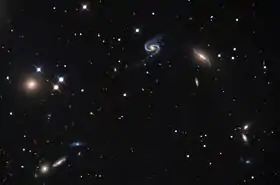| NGC 93 | |
|---|---|
 NGC 93 (top right) and its spiral companion to the left, NGC 90 | |
| Observation data (J2000 epoch) | |
| Constellation | Andromeda |
| Right ascension | 00h 22m 03.211s[1] |
| Declination | +22° 24′ 29.15″[1] |
| Redshift | 0.017946[2] |
| Heliocentric radial velocity | 5380 ± 10 km/s[2] |
| Distance | 259.7 ± 68.1 Mly (79.633 ± 20.875 Mpc)[2] |
| Apparent magnitude (V) | 14.34 [2] |
| Characteristics | |
| Type | S [2] |
| Apparent size (V) | 1.4' x 0.7' [3] |
| Other designations | |
| UGC 209,[2] MCG+04-02-012,PGC 1412[2] | |
NGC 93 is an interacting spiral galaxy estimated to be about 260 million light-years away in the constellation of Andromeda. It was discovered by R. J. Mitchell in 1854.[3] The galaxy is currently interacting with NGC 90 and has some signs of interacting with it.
NGC 93 and NGC 90 form the interacting galaxy pair Arp 65.
References
- 1 2 Skrutskie, Michael F.; Cutri, Roc M.; Stiening, Rae; Weinberg, Martin D.; Schneider, Stephen E.; Carpenter, John M.; Beichman, Charles A.; Capps, Richard W.; Chester, Thomas; Elias, Jonathan H.; Huchra, John P.; Liebert, James W.; Lonsdale, Carol J.; Monet, David G.; Price, Stephan; Seitzer, Patrick; Jarrett, Thomas H.; Kirkpatrick, J. Davy; Gizis, John E.; Howard, Elizabeth V.; Evans, Tracey E.; Fowler, John W.; Fullmer, Linda; Hurt, Robert L.; Light, Robert M.; Kopan, Eugene L.; Marsh, Kenneth A.; McCallon, Howard L.; Tam, Robert; Van Dyk, Schuyler D.; Wheelock, Sherry L. (1 February 2006). "The Two Micron All Sky Survey (2MASS)". The Astronomical Journal. 131 (2): 1163–1183. Bibcode:2006AJ....131.1163S. doi:10.1086/498708. ISSN 0004-6256. S2CID 18913331.
- 1 2 3 4 5 6 7 "NED results for object NGC 0093". National Aeronautics and Space Administration / Infrared Processing and Analysis Center. 2008. Retrieved 26 November 2016.
- 1 2 "NGC Objects: NGC 50 - 99".
External links
 Media related to NGC 93 at Wikimedia Commons
Media related to NGC 93 at Wikimedia Commons
This article is issued from Wikipedia. The text is licensed under Creative Commons - Attribution - Sharealike. Additional terms may apply for the media files.